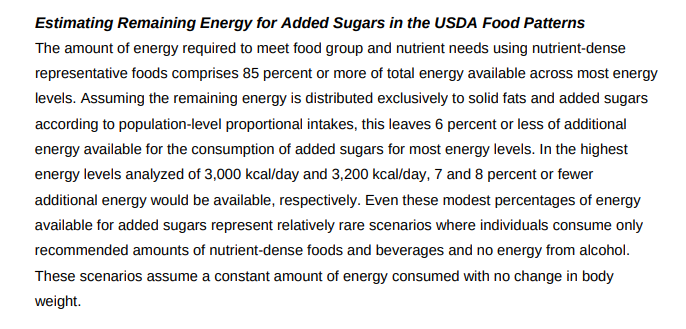Some folks are mad that the Dietary Guidelines didn’t lower the added sugar rec from 10% of cals to 6.
They say it’s rejecting the science of the advisory committee.
I think it’s the right call. This is a thread about why. https://www.nytimes.com/2020/12/29/health/dietary-guidelines-alcohol-sugar.html
They say it’s rejecting the science of the advisory committee.
I think it’s the right call. This is a thread about why. https://www.nytimes.com/2020/12/29/health/dietary-guidelines-alcohol-sugar.html
Let’s look at how the committee got 6%.
It’s NOT because 6% is better than 10% (we don’t have anything like the granularity of evidence to determine that).
It’s because, once you get all your nutrients there aren’t many calories left for dessert.
https://www.dietaryguidelines.gov/sites/default/files/2020-07/ScientificReport_of_the_2020DietaryGuidelinesAdvisoryCommittee_first-print.pdf
It’s NOT because 6% is better than 10% (we don’t have anything like the granularity of evidence to determine that).
It’s because, once you get all your nutrients there aren’t many calories left for dessert.
https://www.dietaryguidelines.gov/sites/default/files/2020-07/ScientificReport_of_the_2020DietaryGuidelinesAdvisoryCommittee_first-print.pdf
It’s on p.698 of the advisory council report.
They added up the calories necessary to get all the recommended servings & nutrients: 85%
They divided the remaining 15% discretionary calories between solid fats & added sugars 55/45 because that is how they think people do it
They added up the calories necessary to get all the recommended servings & nutrients: 85%
They divided the remaining 15% discretionary calories between solid fats & added sugars 55/45 because that is how they think people do it
But wait!
The Guidelines “explicitly emphasize that a healthy dietary pattern is not a rigid prescription.”
6% added sugar sounds pretty rigid to me.
And figuring out that you need 85% of calories for nutrition (not 84 or 86) sounds rigid too.
http://www.dietaryguidelines.gov
The Guidelines “explicitly emphasize that a healthy dietary pattern is not a rigid prescription.”
6% added sugar sounds pretty rigid to me.
And figuring out that you need 85% of calories for nutrition (not 84 or 86) sounds rigid too.
http://www.dietaryguidelines.gov
Here’s the thing.
We don’t have ANYTHING LIKE evidence to determine exact amounts of food or nutrients that are optimal. I give the Guidelines huge props for moving AWAY from the pre-2015 numbers-of-servings recommendations, because they were unsupportable.
We don’t have ANYTHING LIKE evidence to determine exact amounts of food or nutrients that are optimal. I give the Guidelines huge props for moving AWAY from the pre-2015 numbers-of-servings recommendations, because they were unsupportable.
If we’re going to have a better public conversation about nutrition, it has to start with the fact that what we know is absolutely dwarfed by what we don’t know.
That is why making super-specific recommendations on what we know is silly.
That is why making super-specific recommendations on what we know is silly.
But there’s a big downside to it.
When you tell people things like limit sugars to 6% (or 10%, for that matter) of calories, you’re telling them to do something that is A) unsupported by evidence but more importantly B) IMPOSSIBLE.
When you tell people things like limit sugars to 6% (or 10%, for that matter) of calories, you’re telling them to do something that is A) unsupported by evidence but more importantly B) IMPOSSIBLE.
How many people can parse their diet finely enough to figure out whether they’re getting 6, or 8, or 10% of calories from added sugars?
I cook almost all my own food, I know what’s in things to within an inch of their lives and I CAN’T DO IT.
I cook almost all my own food, I know what’s in things to within an inch of their lives and I CAN’T DO IT.
Super-specific, impossible recommendations leave people believing that healthful eating is really really complicated and the province of experts.
If you were looking for way to disempower people, and discourage them from making changes, this would be the way.
If you were looking for way to disempower people, and discourage them from making changes, this would be the way.
Should we eat less added sugar?
OF COURSE WE SHOULD. We eat way too much, and it contributes to our collective obesity problem. Public health authorities, and also crank food columnists, are unite on this.
OF COURSE WE SHOULD. We eat way too much, and it contributes to our collective obesity problem. Public health authorities, and also crank food columnists, are unite on this.
Does industry exert too much influence on the Dietary Guidelines?
OF COURSE IT DOES. @MarionNestle wrote the book on that in 2007.
But the problem with sugar recommendations pales in comparison to the problem with dairy recommendations. https://www.amazon.com/Food-Politics-Influences-Nutrition-California/dp/0520254031
OF COURSE IT DOES. @MarionNestle wrote the book on that in 2007.
But the problem with sugar recommendations pales in comparison to the problem with dairy recommendations. https://www.amazon.com/Food-Politics-Influences-Nutrition-California/dp/0520254031
Would you like a better Dietary Guideline?
Here's mine: Eat a wide variety of whole-ish foods you enjoy in quantities consistent with the weight you want to be.
Thanks for listening. https://www.washingtonpost.com/lifestyle/food/heres-what-the-governments-dietary-guidelines-should-really-say/2019/03/25/69f86e12-4beb-11e9-93d0-64dbcf38ba41_story.html
Here's mine: Eat a wide variety of whole-ish foods you enjoy in quantities consistent with the weight you want to be.
Thanks for listening. https://www.washingtonpost.com/lifestyle/food/heres-what-the-governments-dietary-guidelines-should-really-say/2019/03/25/69f86e12-4beb-11e9-93d0-64dbcf38ba41_story.html

 Read on Twitter
Read on Twitter


